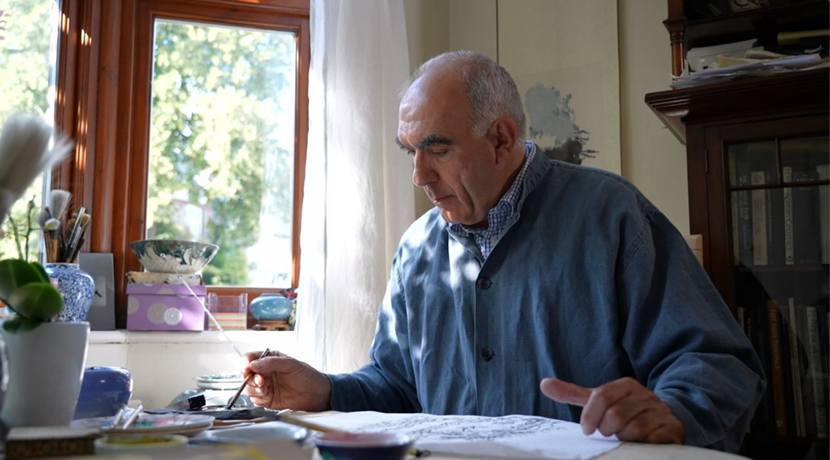Peter Cavaciuti: Injecting Chinese artistic spirit into foreign soil
Professional artist Peter Cavaciuti has been interested in Chinese painting for decades. He is based in Cambridge, and elsewhere. In the 1970s, he learned Chinese painting in London from Fei Chengwu, the ‘chief disciple’ of Xu Beihong (1895-1953), who is a pioneer of modern Chinese art in the twentieth century. Cavaciuti also went to China to study Chinese art at the Central Academy of Fine Arts in Beijing in the 1980s.
Cavaciuti has been engaged in teaching for more than 30 years, and has also held exhibitions in the Royal Academy of Arts, the Royal Watercolor Association, as well as in Europe, Asia and other regions. Recently, Cavaciuti's individual summer exhibition was held by Cam Rivers Publishing, catching the attention of several overseas experts. His continued research and study of Chinese culture and aesthetics, especially Chado (The Way of Tea) and Chan (Zen) Buddhism, have contributed greatly to this field. He is the chairman of the Cambridge Asian Culture Society, and an art teacher at the Cambridge Chinese Community Centre.
In this exclusive interview, Cavaciuti showed a foreign artist's enthusiasm and an alternative interpretation of Chinese painting and Chinese culture based on his learning experience, as well as his understanding and years of experience teaching Chinese painting.

Peter Cavaciuti
Earnest teachings led to special interest in Chinese painting
People's Daily Online: When did you first come across Chinese culture?
Cavaciuti: My uncle took me to the British Museum to have a look at Greek and Roman art when I was five. And I first saw Tang sculptures, you know, funerary sculptures. The wonderful lead-glazed camels and horses, and I fell in love with them. So I really loved those, and it was just a natural progression. From there, it grew and grew.
People's Daily Online: You were a student of a Chinese artist, Fei Chengwu, who was the student of Chinese painter Xu Beihong. How did he bring you into the world of Chinese painting, and how did he influence your artworks?
Cavaciuti: I was studying at the School of Oriental and African Studies (SOAS), University of London. I was using the library there and I saw my future teacher’s book Brush Drawing in the Chinese Manner, and I really liked that. So I wrote to Fei Chengwu. And then he brought me into it by being my teacher. Through his guidance, I was led into a totally new world. A wonderful world and a creative world. Also with an apprenticeship in Chinese painting, it’s not like a Western one where you have to sort of express yourself. In Asian art or Chinese art in particular, you’re guided. And it’s all to do with your spirit. Also, I realised that how he’d taught me was Chinese classical painting, but also how you had to develop your own voice. So that was really important – how you look at nature, how you sketch, and you’re more open to things and flexible.
People's Daily Online: You studied in China for a time. Can you share with us your study experience and what it was like when you lived in China in the 1980s?
Cavaciuti: Well, intensive study was eight years, and then I was fortunate to study also in Beijing in the Central Academy of Fine Arts so I continued there. It was much, much more than I imagined, because the people were very friendly. I enjoyed it very much. I was able to travel to places I had just copied as landscapes, like the Anhui Province. I went to Huangshan, Guilin, and then I went to Yunnan and travelled around. That really developed my experience. So I was able to see things for myself, with my own eyes. What you should do as a painter is you should read ten thousand books and travel ten thousand miles.

Peter Cavaciuti
Promoting integration of East and West
People's Daily Online: What do you think are the biggest differences in characteristics between Chinese and Western painting? How are they related to the differences in cultural thinking and understanding?
Cavaciuti: For a start, Chinese art is already abstract and already highly formalised and based on calligraphy, based on line. Already, there are things that are so different to Western art, that are inherent in Chinese art. There are no shadows in Chinese painting and the fixed point perspective isn’t used. A line in Chinese art is used as and based on Chinese calligraphy, so it has to be fluid and it has to have movement, and be beautiful in itself. So every line, every dot, has to mean something and also has a relationship with each other. The materials are very different. The brush is held differently, perpendicularly, and you have to accomplish that. The paper is different; the paper is absorbent. You can’t erase things as easily in Chinese paintings as you can in watercolour. Some of the aspects of Chinese art that are more developed are that you can paint on the reverse – with Western watercolours, you can’t do that. I would think the Chinese techniques are really the most difficult in the world!
People's Daily Online: You like Chinese Buddhist culture and East Asian tea culture very much. How has your in-depth study of these fields influenced your painting style and creative thinking?
Cavaciuti: I think it’s giving it some more depth and giving it flavour. I think if I just painted, it doesn’t add much; it lacks flavour. I was drawn to Buddhism, Chan or Zen Buddhism, and also a particular practice of tea, Chado. So I’m a practitioner of tea and a tea master, and I teach them as well. That’s helped me a lot: it’s given me another viewpoint, another way of going into things, a whole new area of expression.

Peter Cavaciuti
Plum blossoms everywhere
People's Daily Online: Many of your students came from the UK and other European countries, so their majors and professional lives involve other fields. They are not artists at all; they are conservators, they are natural scientists – so what makes them interested in learning Chinese painting and art and culture from you? How did you promote and spread this kind of inheritance of Chinese painting in the UK?
Cavaciuti: I think a lot of people here – especially in Cambridge – they are curious and obviously intelligent. So they are actually more open-minded to actually absorbing or being introduced to another culture. But that’s one key thing, and the Chinese art, how you approach it: I approach it in a very traditional fashion and so we go step-by-step. The philosophy behind it is important, the techniques are important, so it’s a philosophical, meditative approach. I’m not asking somebody who isn’t a trained artist to create a painting. I’m guiding them how I was guided in how to develop and produce something.
I’m very fortunate; I’ve had some students who have been studying with me for over 30 years. They’ve exhibited and they come from different backgrounds, different countries. So one is a natural scientist; he’s a professor at Trinity Hall, a biochemist and very eminent in his field, and he is passionate about painting orchids and he carves seals. He reads Chinese and he is very good – I am very happy with him. And there’s another artist who is American and she is a conservator, and she’s married to an art historian who is very eminent. She’s a very good painter as well. I’ve got many of them. And then I want to start teaching younger people – I had an experience of teaching maybe seven-year-olds, eight-year-olds, and I was really encouraged. I think they’ve got a natural openness to art – Asian or non-Asian, it doesn’t matter – and it’s such a wonderful method for them to explore.
People's Daily Online: In the process of teaching Chinese painting to art students all over the world, you inherit and pass on the artistic spirit and paintings from your teacher Fei Chengwu and Xu Beihong. Can you give some background on this? You mentioned that your teacher believed that coming to the UK is great for spreading, inheriting, and exchanging with other artists.
Cavaciuti: And actually, that was really important for Xu Beihong, before the 1940s. That’s why he went to study in Paris and Berlin, and did some research in Germany. He felt that studying Western painting would reinvigorate Chinese art, and my own teacher realised – he came to England to do research and study at the Slade School of Art – he felt the same thing. There are important things that we can learn from the West: painting from life, painting directly, is really important.
People's Daily Online: What are your expectations for your students, and for the future development of Chinese painting and Asian culture overseas?
Cavaciuti: I’m really positive. I think already people are very open to different forms of art. The idea that you’re brought up in one particular culture, you don’t have to necessarily follow that. And also the way that the Chinese brush is so expressive and dynamic and abstract falls into place very neatly with Western forms of art. The only thing is, in the past, not many Western artists were educated enough about appreciating good Chinese paintings. If they had had that basis or that understanding, it would really, really help, and to have somebody explain why that painting is good, and why it’s important.
I have hosted many exhibitions and workshop in the U.K. and Europe to provide an opportunity to people to understand the historical and cultural background of my works. For instance, Cam Rivers Arts, a gallery based in central Cambridge, has hosted my solo exhibition in the summer of 2022. We hosted a series of tea ceremonies and workshops, which generated lots of interests locally, and globally through promoting the events virtually. I hope more events like this will be hosted in the future.
People's Daily Online: What are your upcoming plans?
Cavaciuti: We are setting up a new society called Cambridge Asian Culture Society, to invite people to better understand each other. There’s a new idea come about, promoting not just Chinese culture but Asian culture generally, and this is a really wonderful idea.
Photos
Related Stories
- Michael Sheringham: A generational family business, a century-long cultural connection
- Interview: London's Royal Albert Hall hopes to attract more Chinese artists, spectators: CEO
- Alan Macfarlane, social anthropologist at University of Cambridge: Playing a concerto of civilisations
- China hopes Britain will nurture bilateral cooperation: FM spokesperson
- Mark Pollard: An obsession with China that isn’t going away
- Britain should respect legitimate rights, interests of Chinese companies: spokesperson
- Ronnie O'Sullivan: Building a bridge of snooker between China and UK
- Ambassador calls on Chinese, British business communities to further promote cooperation
- Angela Smith: Strengthening Sino-British friendship through football
- Diplomat highlights opportunities for Sino-UK ties
Copyright © 2022 People's Daily Online. All Rights Reserved.









